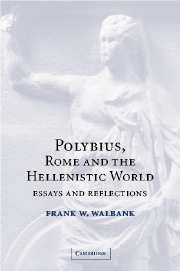Book contents
- Frontmatter
- Contents
- Preface
- Acknowledgements
- List of abbreviations
- 1 Polybian studies, c. 1975–2000
- HISTORICAL AND GEOGRAPHICAL PAPERS
- 2 The geography of Polybius
- 3 Egypt in Polybius
- 4 The surrender of the Egyptian rebels in the Nile delta (Polyb. xxii.17.1–7)
- 5 Two Hellenistic processions: a matter of self-definition
- 6 Polybius and Macedonia
- 7 Sea-power and the Antigonids
- 8 H TΩN OΛΩN EΛΠΙΣ and the Antigonids
- 9 Hellenes and Achaeans: ‘Greek nationality’ revisited
- 10 The Achaean assemblies
- POLYBIUS AS A HISTORIAN
- POLYBIUS ON ROME
- TRANSMISSION OF POLYBIUS
- Bibliography
- Indexes
7 - Sea-power and the Antigonids
Published online by Cambridge University Press: 22 September 2009
- Frontmatter
- Contents
- Preface
- Acknowledgements
- List of abbreviations
- 1 Polybian studies, c. 1975–2000
- HISTORICAL AND GEOGRAPHICAL PAPERS
- 2 The geography of Polybius
- 3 Egypt in Polybius
- 4 The surrender of the Egyptian rebels in the Nile delta (Polyb. xxii.17.1–7)
- 5 Two Hellenistic processions: a matter of self-definition
- 6 Polybius and Macedonia
- 7 Sea-power and the Antigonids
- 8 H TΩN OΛΩN EΛΠΙΣ and the Antigonids
- 9 Hellenes and Achaeans: ‘Greek nationality’ revisited
- 10 The Achaean assemblies
- POLYBIUS AS A HISTORIAN
- POLYBIUS ON ROME
- TRANSMISSION OF POLYBIUS
- Bibliography
- Indexes
Summary
An anecdote recorded by Phylarchus relates how Patroclus, who is known from other sources as the admiral of Ptolemy II at the time of the Chremonidean War, once sent a present of large fish and green figs to Antigonus Gonatas ‘as a hint at what would happen to him, just as the Scythians did to Darius when he was invading their country. For the Scythians, Herodotus tells us, sent a bird, an arrow || and a frog.’ Antigonus was quick to solve the riddle: ‘either we must be masters of the sea (θαλασσοκρατει̃ν) or else we must eat figs’, that is, go short of food. But was the choice a real one? The answer to that question depends on whether Patroclus' point was a general one – that Macedon must be a sea-power or starve – or a particular one, in the sense that at the time of the incident Antigonus had for instance got himself caught in an awkward situation without access to supplies of food. Oddly enough, some sixty years later his grandson Philip V was to find himself in that very plight. Confined within the Gulf of Bargylia in Caria and unable for several months to make an easy getaway through the Rhodian and Pergamene fleets, he was compelled to furnish an illustration of Patroclus' riddle by feeding his troops throughout the winter of 201/200 largely on figs provided by the Seleucid general Zeuxis and by Greek cities like Magnesia which were short of corn.
- Type
- Chapter
- Information
- Polybius, Rome and the Hellenistic WorldEssays and Reflections, pp. 107 - 126Publisher: Cambridge University PressPrint publication year: 2002

